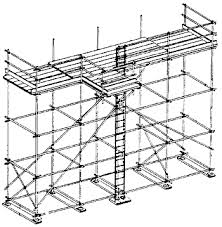记忆方法
1. Scaff (人名:斯卡夫) + old => 斯卡夫这么老了还是被送上了绞刑台,因为他在脚手架上故意将人推下致死而被判处了绞刑。
中文词源
scaffold 断头台,绞刑架,脚手架
来自中古英语 scaffold,脚手架,临时搭的平台,来自古法语 eschaffaut,高台,来自拉丁语 scadafaltum,来自 ex-,向外,catafalcum,高台,高的看台,可能来自 cata-,向下,falcum,架子, 平台,词源同 balcony,balk.后引申词义断头台,绞刑架。
英语词源
- scaffold
-
scaffold: [14] Historically, scaffold and catafalque [17] ‘coffin-stand’ are virtually the same word. Catafalque comes via French catafalque and Italian catafalco from Vulgar Latin *catafalcum, a word of uncertain origin. Combination with the prefix ex- produced *excatafalcum, which passed into English via Old French eschaffaut and Anglo-Norman *scaffaut.
The word originally denoted any sort of platform, and did not narrow down to ‘platform for executions’ until the 16th century. The derivative scaffolding, a term which originally alluded to the platforms set up around a building rather than to poles supporting them, also dates from the 14th century.
=> catafalque - scaffold (n.)
- mid-14c., "wooden framework used in building, etc., temporary structure for workmen to make walls," a shortening of an Old North French variant of Old French eschafaut "scaffold" (Modern French échafaud), probably altered (by influence of eschace "a prop, support") from chaffaut, from Vulgar Latin *catafalicum (see catafalque). Meaning "platform for a hanging" is from 1550s. Dutch schavot, German Schafott, Danish skafot are from French. As a verb from 1540s.
权威例句
- 1. Moore ascended the scaffold and addressed the executioner.
- 穆尔走上断头台,和刽子手说话。
- 2. He turned towards the scaffold, and stretched forth his arms.
- 他转向刑台, 向前伸出双臂.
- 3. Then, down he sank upon the scaffold!
- 随后, 他就瘫倒在刑台上了!
- 4. Treating each tree as a separate scaffold of a very low - headed tree.
- 将每棵树作为一个树冠很矮的骨干枝来处理.
- 5. The men on the scaffold turned about and drank to our healths.
- 脚手架上的工人也转过身来为我们的健康干杯.
